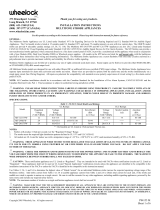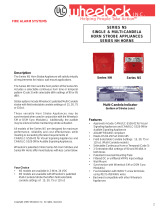
RENSEIGNEMENTS SUR LE PRODUIT
Cet appareil diffuse un signal de notification sonore pour assurer la sécurité des personnes et des biens. Cet appareil convient parfaitement à tout type d’occupation devant être doté
d’appareils de signalisation conformément au code du bâtiment ou de sécurité incendie ou à tout bâtiment exigeant un moyen d’alarme fiable. Cet appareil est homologué conformément
à la norme CAN/ULC S525 ou CAN/ULC S526. Il est destiné à l’utilisation dans les systèmes d’alarme incendie et doit être installé conformément aux directives du présent manuel, du Code
national du bâtiment du Canada, à la norme CAN/ULC S524 et aux codes locaux régissant les normes pour les appareils de notification dans les systèmes de signalisation de protection. Potter
Electric recommande de disposer les appareils de signalisation conformément aux exigences d’espacement de la norme CAN/ULC S524.
Cet appareil est conçu pour être installé sur la majorité des boîtes simples, des boîtes carrées de 4 po (102 mm) pour prise, des boîtes doubles pour maçonnerie ou des boîtes doubles non
métalliques pour interrupteur. L’entrée du conduit sélectionnée sur la boîte doit assurer un dégagement approprié des fils.
1. Le câblage doit être conforme au Code canadien de l’électricité C22.1, Partie 1, Safety Standard for Electrical Installations, Sec. 32.
2. Poser un câble de calibre minimum d’un de 18 comportant au moins 2 conducteurs.
3. Poser une boîte pour chaque appareil de signalisation. Visser le support sur la boîte. Insérer l’appareil sur le support et le faire glisser fermement vers la droite pour le brancher dans la prise
du réceptacle. Mettre la vis de montage comme illustré, puis la serrer. Recouvrir l’ensemble du boîtier de plastique.
CONSIGNES SUPPLÉMENTAIRES POUR
LES APPAREILS DE SIGNALISATION SONORE : CAN/ULC
RENSEIGNEMENTS CAN/ULC SUR LE PRODUIT – CARACTÉRISTIQUES NOMINALES D’INTENSITÉ ACOUSTIQUE
ET DE COURANT AVERTISSEUR
Caractéristiques sonores directionnelles :
pour un avertisseur et un avertisseur/stroboscope
Angle horizontal
-3 dBA 155 et 55
-6 dBA
Angle vertical
-3 dBA 150 et 55
-6 dBA 150
CARACTÉRISTIQUES SONORES NOMINALES EN DÉCIBELS DANS
UNE CHAMBRE ANÉCHOÏQUE ULC (dBA à 3 mètres)
POUR UN AVERTISSEUR
Mode de l’avertisseur Tension stabilisée minimum
de 24VRDA Caractéristiques
nominales dBnps
Temp. 3 520 Hz (NORMAL)* 84.7 dBA
Temp. 3 520 Hz (FORT)* 88.3 dBA
Temp. 4 520 Hz (NORMAL)* 84.7 dBA
Temp. 4 520 Hz (FORT)* 88.3 dBA
Page 4
GARANTIE LIMITÉE
Potter Electrical Signal Company, LLC garantit à l’acheteur initial que, dans des conditions normales d’utilisation et d’entretien, l’appareil sera exempt de tout défaut de fabrication ou de matériaux pendant 60 mois à
compter de la date de fabrication (ou pendant aussi longtemps que l’exigent les lois applicables).
Cette garantie est nulle et sans effet lorsque les dommages ou la défectuosité sont attribuables : à un accident, un usage abusif, un abus, une utilisation anormale, une installation fautive, un
contact avec un liquide, un incendie, un séisme ou toute autre cause externe; à l’utilisation de l’appareil en dehors des directives établies par Potter Electrical Signal Company, LLC; à l’entretien,
la modification, la maintenance ou la réparation effectuée par toute autre entreprise que Potter Electrical Signal Company, LLC. Cette garantie ne transfère pas aux propriétaires ou acheteurs
ultérieurs de cet appareil. Cette garantie ne s’applique pas non plus : aux pièces consomptibles, comme les piles; aux dommages cosmétiques, y compris, mais sans en exclure d’autres, aux
égratignures ou bosses; aux défaillances attribuables à l’usure normale ou au vieillissement normal de l’appareil; si le numéro de série de l’appareil a été supprimé ou altéré.
DANS LES LIMITES AUTORISÉES PAR LA LOI, LA PRÉSENTE GARANTIE ET LES RECOURS QUI Y SONT DÉFINIS SONT EXCLUSIFS ET REMPLACENT TOUTE AUTRE GARANTIE, RECOURS ET
CONDITION, QU’ELLES SOIENT ORALES, ÉCRITES, LÉGALES, EXPRESSES OU IMPLICITES. POTTER ELECTRIC SIGNAL COMPANY, LLC DÉCLINE TOUTE GARANTIE LÉGALE ET IMPLICITE, Y
COMPRIS, MAIS NON DE FAÇON LIMITATIVE, TOUTE GARANTIE DE COMMERCIALITÉ OU D’ADAPTATION À UN USAGE PARTICULIER AINSI QUE LES GARANTIES CONTRE LES VICES CACHÉS OU
LES DÉFAUTS LATENTS, DANS LES LIMITES AUTORISÉES PAR LA LOI. DANS LA MESURE OU CES GARANTIES NE PEUVENT ETRE REJETEES, ET DANS LA MESURE PERMISE PAR LA LOI
APPLICABLE, TOUTE GARANTIE IMPLICITE S’APPLIQUE UNIQUEMENT À LA PÉRIODE DE GARANTIE INDIQUÉE PLUS HAUT. À NOTER QUE CERTAINS ÉTATS (PAYS ET PROVINCES/TERRITOIRES)
N’ACCEPTENT PAS LES LIMITATIONS QUANT À LA DURÉE DES GARANTIES (OU DES CONDITIONS) IMPLICITES. IL SE PEUT DONC QUE LES LIMITATIONS CI-DESSUS NE S’APPLIQUENT PAS
DANS VOTRE CAS. DANS LA MESURE OÙ CELA N’EST PAS EXCLU DANS LA PRÉSENTE GARANTIE ET DANS LES LIMITES AUTORISÉES PAR LA LOI, POTTER ELECTRICAL SIGNAL COMPANY, LLC
NE POURRA ÊTRE TENU RESPONSABLE DES DOMMAGES DIRECTS, SPÉCIAUX, INDIRECTS OU CONSÉCUTIFS DÉCOULANT DE TOUTE CONDITION OU BRIS DE LA GARANTIE OU PORTANT
SUR LA VENTE, L’UTILISATION OU LA RÉPARATION DE L’APPAREIL, OU DE TOUTE AUTRE THÉORIE LÉGALE, Y COMPRIS, MAIS NON DE FAÇON LIMITATIVE, DE LA PERTE D’USAGE, DE
REVENUS OU DE PROFITS RÉELS OU ANTICIPÉS, DE LA PERTE D’UTILISATION DES FONDS, D’AFFAIRES OU D’OCCASIONS, DE LA PERTE DE CLIENTÈLE OU DE L’ATTEINTE À LA RÉPUTATION.
LA RESPONSABILITÉ MAXIMALE DE POTTER ELECTRICAL SIGNAL COMPANY, LLC NE PEUT EN AUCUN CAS ÊTRE SUPÉRIEURE AU PRIX D’ACHAT DE L’APPAREIL. VEUILLEZ NOTER QUE
CERTAINS ÉTATS (PAYS ET PROVINCES/TERRITOIRES) N’AUTORISENT PAS L’EXCLUSION OU LA LIMITATION DES DOMMAGES DIRECTS, ACCIDENTELS OU CONSÉCUTIFS, DE SORTE QUE LES
LIMITATIONS OU EXCLUSIONS CI-DESSUS POURRAIENT NE PAS S’APPLIQUER DANS VOTRE CAS.
Si un défaut de fabrication ou de matériau entraîne la défaillance de votre appareil pendant la période de garantie, vous devez le retourner à Potter Electrical Signal Company, LLC, port payé, à l’adresse
suivante : Potter Electrical Signal Company, LLC, 1609 Park 370, Hazelwood MO 63042. Vous devez apporter la preuve de la date d’achat de l’appareil, à la satisfaction de Potter Electric Signal Company, LLC.
Vous devez aussi fournir votre adresse pour le retour de l’appareil. Le service sous garantie peut être uniquement exécuté par le personnel de Potter Electric Signal Company, LLC, dans les installations de
Potter Electric Signal Company, LLC’s de Hazelwood au Missouri. Il faut aussi emballer soigneusement l’appareil pour réduire au minimum les risques de dommage pendant le transport. Si nous recevons un
appareil endommagé en cours de transport, nous vous en aviserons et il vous reviendra d’obtenir dédommagement de la part du transporteur.
Si vous transmettez une demande valable à Potter Electrical Signal Company, LLC pendant la période de garantie, Potter Electrical Signal Company, LLC assumera, sans frais et à sa discrétion, la
réparation de votre appareil ou vous fournira un appareil neuf ou remis à neuf; vous n’aurez qu’à assumer les frais d’acheminement de l’appareil par la poste. Potter Electrical Signal Company, LLC ne
s’engage pas à rembourser les frais des pièces de rechange ou des réparations effectuées par d’autres parties. L’appareil réparé ou de remplacement vous sera retourné sans frais et il sera couvert en
vertu de la garantie pendant la période de garantie résiduelle, le cas échéant. Lors du remplacement d’un produit ou d’une pièce, l’élément de remplacement devient votre propriété tandis que l’élément
remplacé devient la propriété de Potter Electrical Signal Company, LLC. Pour de plus amples renseignements sur la garantie ou le produit, visitez www.pottersignal.com.
LA PRÉSENTE GARANTIE VOUS ACCORDE DES DROITS PARTICULIERS, MAIS IL SE POURRAIT QUE VOUS AYEZ AUSSI D’AUTRES DROITS, QUI VARIENT D’UN ÉTAT (OU PAYS OU
PROVINCE/TERRITOIRE) À L’AUTRE. DANS LA PRÉSENTE GARANTIE, POTTER ELECTRICAL SIGNAL COMPANY, LLC NE LIMITE PAS VOS DROITS ET N’EN EXCLUT AUCUN, DU MOINS DANS
LES LIMITES AUTORISÉES PAR LA LOI. POUR BIEN COMPRENDRE VOS DROITS, VOUS DEVRIEZ CONSULTER LA LÉGISLATION DE VOTRE PAYS, PROVINCE/TERRITOIRE OU ÉTAT.
* Temp 4 520 Hz mesuré conformément à la norme ANSI/UL 2075
AVIS :
LE CODE NATIONAL DU BÂTIMENT ET LA NORME
CAN/ULC S525 EXIGENT QUE TOUS LES
AVERTISSEURS DESTINÉS À L’ÉVACUATION DU
BÂTIMENT DIFFUSENT DES SIGNAUX TEMPORELS
CODIFIÉS.
LES APPAREILS ONT FAIT L’OBJET D’ESSAIS À 0 °C,
À 49 °C ET À UNE HUMIDITÉ DE 93 %.
LA CADENCE TEMPORELLE À QUATRE TONALITÉS
(TEMPORELLE 4) PEUT ÊTRE OBTENUE AVEC CE
PRODUIT LORSQU’IL UTILISÉ AVEC LE MODULE DE
SYNCHRONISATION GTSM OU LE PROTOCOLE DE
SYNCHRONISATION GTSM POTTER ELECTRIC.
= AUCUNE PERTE MESURÉE
OBTENIR LE DÉCIBEL DE CORNE CAN/ULC ET LES VALEURS NOMINALES DE COURANT POUR L'APPAREIL AUDITIF LFH-24, VOIR INFORMATIONS SUR
LA PAGE 1.
OBTENIR LE DÉCIBEL DE CORNE CAN/ULC ET LES VALEURS NOMINALES DE COURANT POUR L'APPAREIL AUDITIF LFHS-24, VOIR INFORMATIONS SUR
LA PAGE 2.
CARACTÉRISTIQUES SONORES NOMINALES EN DÉCIBELS DANS
UNE CHAMBRE ANÉCHOÏQUE ULC (dBA à 3 mètres)
POUR UN AVERTISSEUR/STROBOSCOPE
Mode de l’avertisseur Tension stabilisée minimum
de 24VRDA Caractéristiques
nominales dBnps
Temp. 3 520 Hz (NORMAL)* 88.2 dBA
Temp. 3 520 Hz (FORT)* 90.1 dBA
Temp. 4 520 Hz (NORMAL)* 87.1 dBA
Temp. 4 520 Hz (FORT)* 88.0 dBA
Date de publication du manuel :
02/01/15
Avis important :
Ces renseignements ont été préparés par Potter Electrical Signal Company, LLC (ci-après « Potter ») à titre informatif uniquement; ils sont de nature sommaire et ne constituent nullement des avis juridiques et ne doivent par conséquent pas être utilisés à une telle fin. À cet égard, Potter ne fait aucune
représentation ni garantie, explicite ou implicite, que ces renseignements sont exhaustifs et exacts, à jour, ou conformes aux lois, règlements ou règles locaux, provinciaux ou fédéraux. Ces renseignements ne tiennent pas compte de toutes les considérations juridiques, en raison des inévitables incertitudes quant
à l’interprétation des lois et règlements et à la mise en application de ces lois et règlements en fonction des situations particulières. Les activités de chaque personne peuvent modifier les obligations pertinentes en vertu des lois ou des règlements en vigueur. Par conséquent, ces renseignements ne doivent être
utilisés qu’à des fins informationnelles et ne doivent pas servir à remplace un avis juridique professionnel. Potter n’assumera aucune responsabilité quant aux mesures ou activités qui pourraient être, ou ne pas être, prises ou effectuées à la suite de ces renseignements.
Potter Electric Signal Company, LLC
1609 Park 370, Hazelwood, MO 63042
TÉLÉPHONE : +1 800-325-3936
www.pottersignal.com
550-0649-AAD












